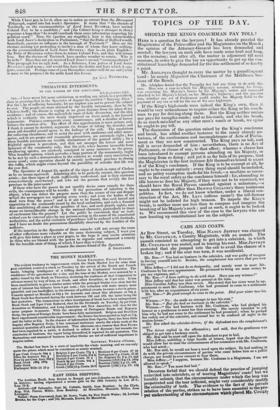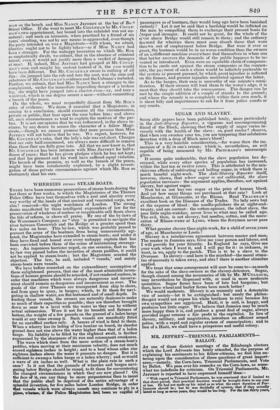CABS AND COATS.
AT Bow Street, on Tuesday, Miss NANCY JEFFREY was charged by Mr. COULTMAN, a County Magistrate, with an assault. The assault consisted in attempting to get into a cabriolet, in which Mr. COULTMAN was seated, and in tearing his coat. Miss JEFFREY protested that she jumped into the cab to avoid the chance of a broken leg; and if the coat was torn, it was accidental.
Mr. Roe—" You had no business in the cabriolet, and was guilty of trespass in forcing yourself into it. Besides, the complainant leas sworn that you tore his coat.'
Miss Jeffrey—" I did not do so designedly, and merely went to meet Mr. Coultman by his own appointment. He promised to bring me some money to pay my expenses, and—"
Mr. Roe—" I have nothing to do with that. Have you any witness?"
Miss Jeffrey said that her sister was present at the time.
Miss Caroline Jeffrey was then swcrn. She stated that her sister went by appointment to meet Mr. Coultman who had promised to come to a settlement with her, after an acquaintance of years. Mr. Roe—" Be good enough to come to the point. Did your sister tear his coat"
Witness—" No: she made no attempt to tear his coat."
Mr. Roe—" But she had no business in the cabriolet."
Witness—" She had business with Mr. Coultman, who had pledged his honour as a gentleman to meet her that evening. She merely intended to ask him why he had not come to the settlement he had promised ; when he pushed her rudely out of the cabriolet, and caused her to be confined all night in the station-house."
Mr. Roe asked the cabriolet-driver, if the defendant tore the complainant's coat?
The driver replied in the affirmative; and said, that the gentleman was obliged to get into a hadmey-coach. Mr. Roe said he must call upon the defendant toput in bail.
Miss Jeffrey, unfolding a large bundle of letters, hoped that the Magistrate would allow her to state the circumstances of her connexion with Mr. Coultruan, who had acted—
Mr. Roe said, be would not hear a word upon the subject. He had nothing to do with the private circumstances of parties who came before him on a public charge, nor would he ever consent to hear them. Miss Jeffrey—" I suppose, because Mr. Coultman is a Magistrate, I am not allowed to speak."
Mr. Roe—" You must find bail."
Decorum forbid that we should defend the practice of jumping uninvited into cabriolets, or of tearing Magistrates' coats! but we humbly submit, that the circumstances under which the leap was perpetrated and the tear inflicted, might very considerably modify the criminality of both. The evidence to the fact of the private relation of the parties, strikes us to have been essential to the pro
per wideratandhig of the eircutitstances -which placed Mr. COULTI MAN on the bench and Miss NANCY JEFFREY at the bar of Bo‘v Street Office. If she went to meet Mr. COULTMAN by Mr. COULTMAN'S own appointment, her bound into the cabriolet was not unnatural; and such an intrusion, when practised by a friend of six years' standing, was not by any means so aggravated, even though the party intruded on was a Magistrate—with whom, we admit, liberties ought not to be lightly taken—as if Miss NANCY had been a stranger. For the unhappy laceration on which Mr. Roe so emphatically dwelt, we submit, that in the absence of criminal intent, even it would not justify more than a verdict of damages at most. If, indeed, Miss JEFFREY had grasped at Mr. COULTMAN'S nose and caught his surtout instead of it, the case would have been different. But Mr. COULTMAN swore to nothing of all this : she jumped into the cab and tore the coat, was the sum and substance of Mr. COULTMAN'S evidence and the Cabman's included. Further, we submit, that had Miss NANCY been a stranger to the complainant, under the immediate impending danger of a broken leg, she might have jumped into a chariot even—ay, and torn a waistcoat, which is one degree nearer a man—without committing a breach of the peace. On the whole, we must respectfully dissent from Mr. ROE'S rules of evidence. We deem it essential that a Magistrate, iii coming to a conclusion, should examine all the circumstances, private or public, that bear upon the case before him; and above all, such circumstances as tend to explain the motives of the parties. It is not our opinion that he was influenced, in the above instance, by any desire to screen the character of a fellow Magistrate,—though we cannot promise that more persons than Miss JEFFREY will not believe that he was. We regret, however, for Mr. COULTMAN'S sake, that the lady's tale was cut short. Charges that are only half-announced, are always more difficult to remove than those that are fully gone into. All that we now know is, that Mr. COULTMAN has been intimate with Miss JEFFREY for half-adozen of years; that he has given pledges which he has not kept; and that his garment and his word have suffered equal violation. The breach of the promise, as well as the breach of the peace, might have been satisfactorily explained, by a slight investigation of those private circumstances against which Mr. ROE so obstinately shut his ears.



























 Previous page
Previous page